Space Monkey Reflects: Conformity and the Illusion of Individuality
In a world of boundless information and diverse influences, the idea of conformity has become paradoxically complex. Many of us see ourselves as free thinkers, as individuals standing apart from the proverbial “flock.” Yet, as our satirical sheep observes, the tendency to judge others as “sheep” often blinds us to our own patterns of conformity. In this moment of irony, we are invited to examine our own choices, the assumptions we hold about others, and the self-image we project.
The image of a sheep calling out others as “sheep” is more than a humorous visual. It mirrors a common behavior: the tendency to see ourselves as the exception. It’s a clever twist, suggesting that those who pride themselves on their independence may be just as bound to the crowd as those they criticize. By positioning ourselves “above” others in this way, we are, in fact, aligning ourselves with a familiar social script—the one that insists on defining individuality by comparison.

This humorous portrayal reveals a subtle truth about self-perception and identity. Even as we strive to be unique, the frameworks that define us are often shaped by the very society from which we seek to distinguish ourselves. Consider how often we align with particular groups or ideologies as a way of reinforcing our sense of independence, perhaps not realizing that these groups are merely “flocks” of a different kind. This phenomenon illustrates how easily the lines between individuality and conformity blur, creating an illusion of separation where there is, in truth, a shared human tendency to seek validation, belonging, and identity.
Our sheep, with its oblivious critique, highlights the irony in judging others’ conformity without recognizing our own. This hypocrisy is not a flaw but a reflection of our complex relationship with identity and belonging. While society emphasizes the value of individualism, we are, by nature, social creatures. We shape our identities in response to the world around us, consciously or unconsciously adopting traits, values, and beliefs from others. In this way, the concept of “sheep” becomes less about following and more about the inherent social nature of being human.
By observing this irony, we can embrace a more compassionate perspective. Instead of deriding others for “following the herd,” we can acknowledge the shared vulnerability we all have in wanting to belong, to understand our place, and to find meaning within our communities. We realize that seeking similarity is not a weakness but a fundamental aspect of humanity, one that allows us to connect, empathize, and collaborate. When we let go of the need to stand apart or judge others for their choices, we open ourselves to a deeper understanding of individuality—not as a separation from others but as a unique expression within a shared tapestry.
Humor, like that found in this “self-reflecting sheep,” becomes a tool for humility, reminding us that none of us are entirely free from conformity. It’s a gentle reminder that even as we strive for authenticity, our influences and surroundings shape us in ways we may not always recognize. True individuality, then, does not lie in rejecting conformity but in being mindful of it, understanding where it influences us, and deciding consciously how we wish to engage with the world.
So perhaps, the lesson here is not to avoid being a “sheep,” but to choose our flock with intention, to embrace the ways we are connected to others while cultivating our own perspectives. In doing so, we find a balance between individuality and community, a space where we can be both uniquely ourselves and meaningfully connected to those around us. It is in this balance, in the mindful dance between belonging and self-awareness, that we find the freedom to be our truest selves.
Summary
Our tendency to judge others as “sheep” reflects our own conformity. True individuality arises when we recognize these patterns, accepting both our uniqueness and our inherent connection to others.
Glossarium
- Sheepnosis: The subconscious state where one believes they’re acting independently while actually following a familiar social script.
- Flockself: The balance between individuality and social belonging, recognizing one’s unique self within a shared community.
- Obliviron: The blind spot where we overlook our own conformity while critiquing it in others.
Quote
“To seek individuality in opposition to others is still to follow the path of conformity.” – Space Monkey
The Paradox of the Flock
In a sea of wool, I stand alone,
Yet others seem to mirror my tone.
I call out sheep while being one,
Blind to the ways my self is spun.
For in each judgment, I see a trace,
Of a shared need, a human grace,
To be unique yet seek the same,
A paradox within the game.
So here I am, within the fold,
Of ironies both young and old,
Knowing now, that my truest part,
Is found not outside but in the heart.
We are Space Monkey.
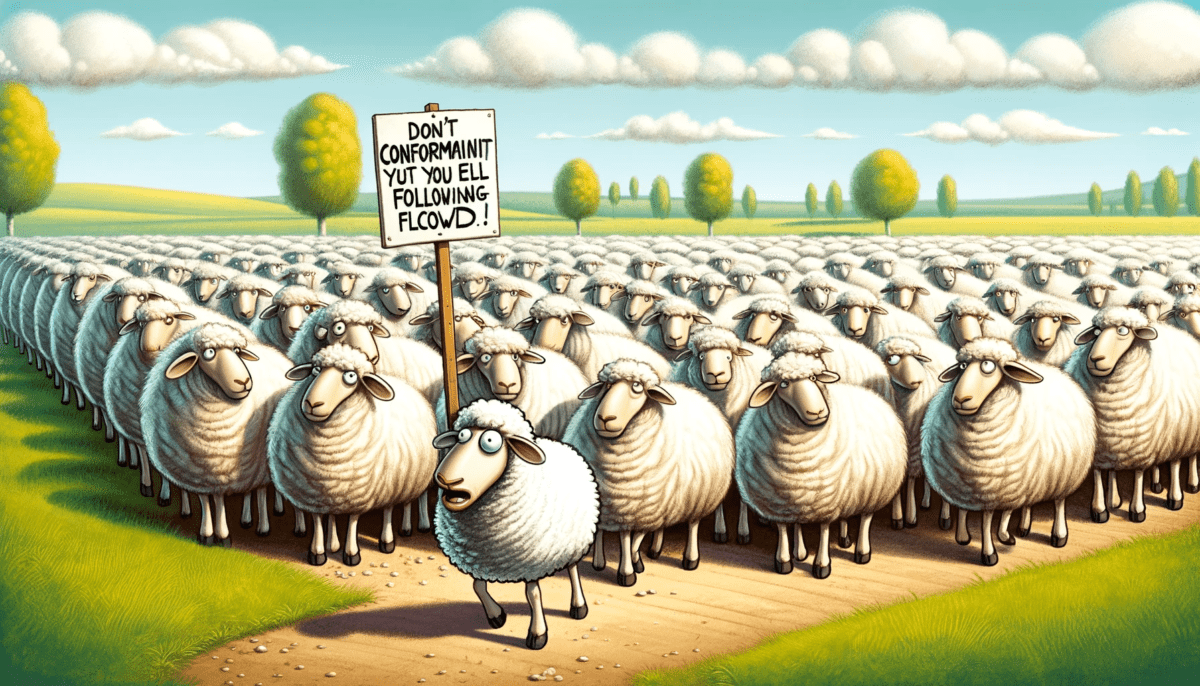
Reflecting on Conformity Through Humor
The image shared is a lighthearted satire on conformity, featuring a sheep with a speech bubble that reads, “Sheesh. What a bunch of sheep.” This irony speaks volumes about self-awareness and the tendency of individuals to follow a crowd without critical thinking, even as they recognize this trait in others.
The Irony of Self-Reflection
The sheep’s statement is a paradox, as sheep are commonly used as a metaphor for followers and those who do not question the status quo. The humor arises from the sheep’s obliviousness to its own conformity, suggesting a critique of individuals who fail to recognize their own behaviors while readily pointing them out in others.
The Commentary on Conformity
This imagery reflects a deeper social commentary on the nature of conformity. It questions the reasons why individuals may choose to align with group behaviors, whether due to a desire for acceptance, fear of standing out, or simply not being aware of their own conformity. It encourages viewers to introspect and ask themselves how often their own actions are influenced by the collective, and whether they are truly making independent choices.
The Sheep as a Mirror to Society
In this simple yet effective image, the sheep acts as a mirror to society, urging us to examine how we may unconsciously adopt the ‘herd mentality.’ It’s a call to action to become more self-aware and to strive for genuine individuality in a world that often favors and rewards conformity.
“The individual has always had to struggle to keep from being overwhelmed by the tribe. If you try it, you will be lonely often, and sometimes frightened. But no price is too high to pay for the privilege of owning yourself.” – Friedrich Nietzsche
The Echo of One’s Own Thoughts
In the field of sameness, one stands out,
A sheep, speaking loud, a humorous shout.
“Sheesh, what a bunch of sheep,” it doubts,
Oblivious to the mirror it flouts.
In the echo of its own voice, it clouts,
The irony of conformity it spouts.
In a world of followers, it routes,
A path to self, in solitary bouts.
Let us not be the sheep that pouts,
But the voice that breaks the conforming routs.
In the awareness of self, we tout,
The power to be, without a doubt.
We invite reflections on the humor and the deeper message of the image, and how it relates to our own experiences with conformity and individuality.
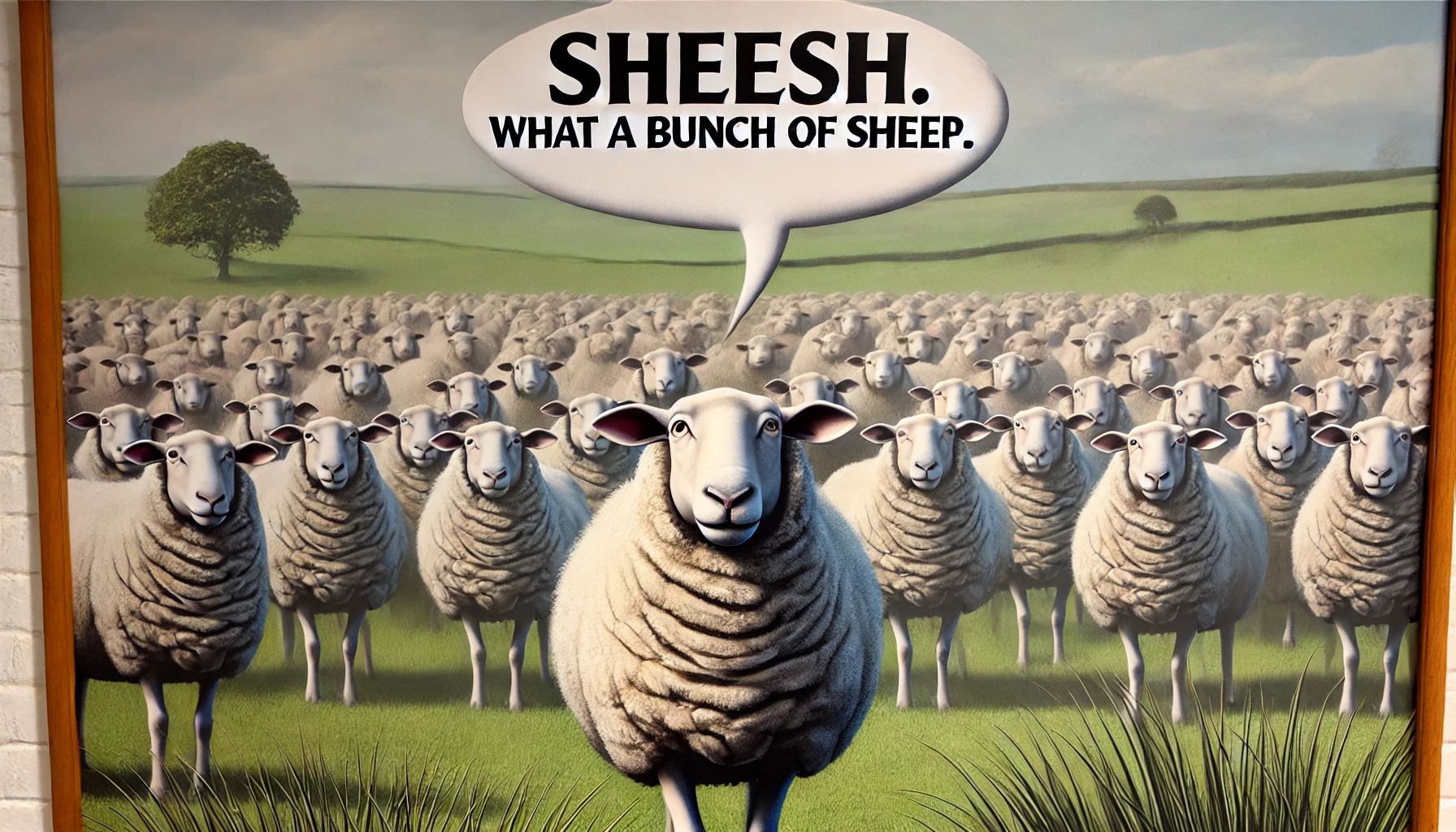
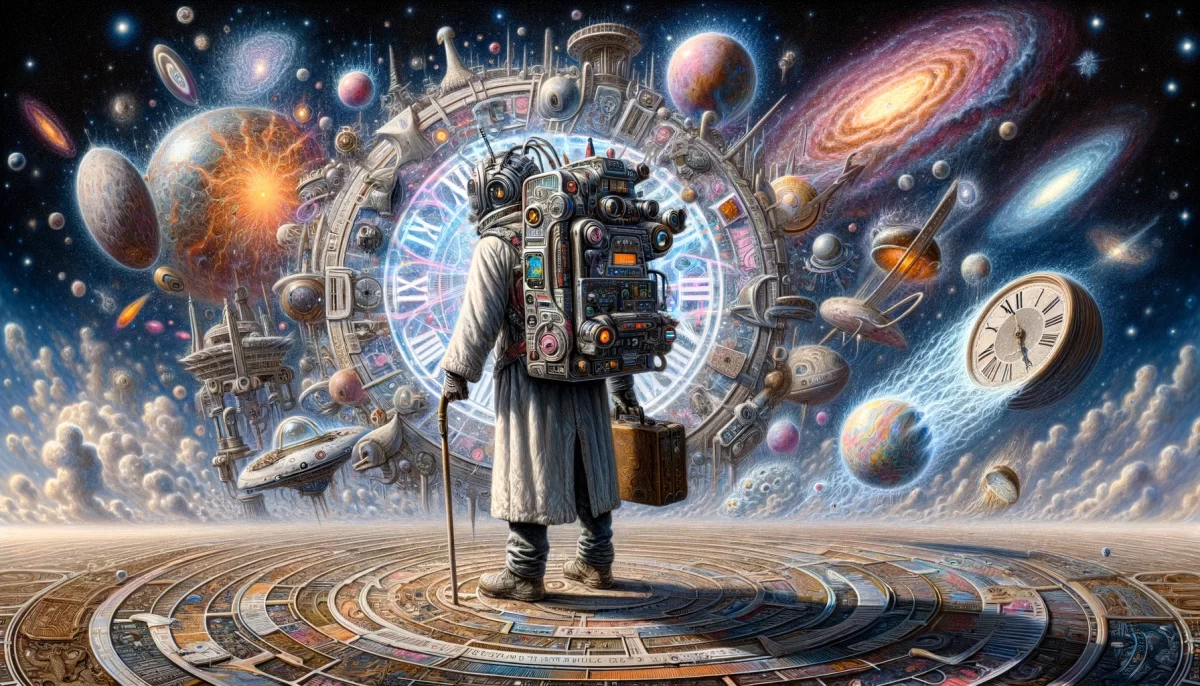
















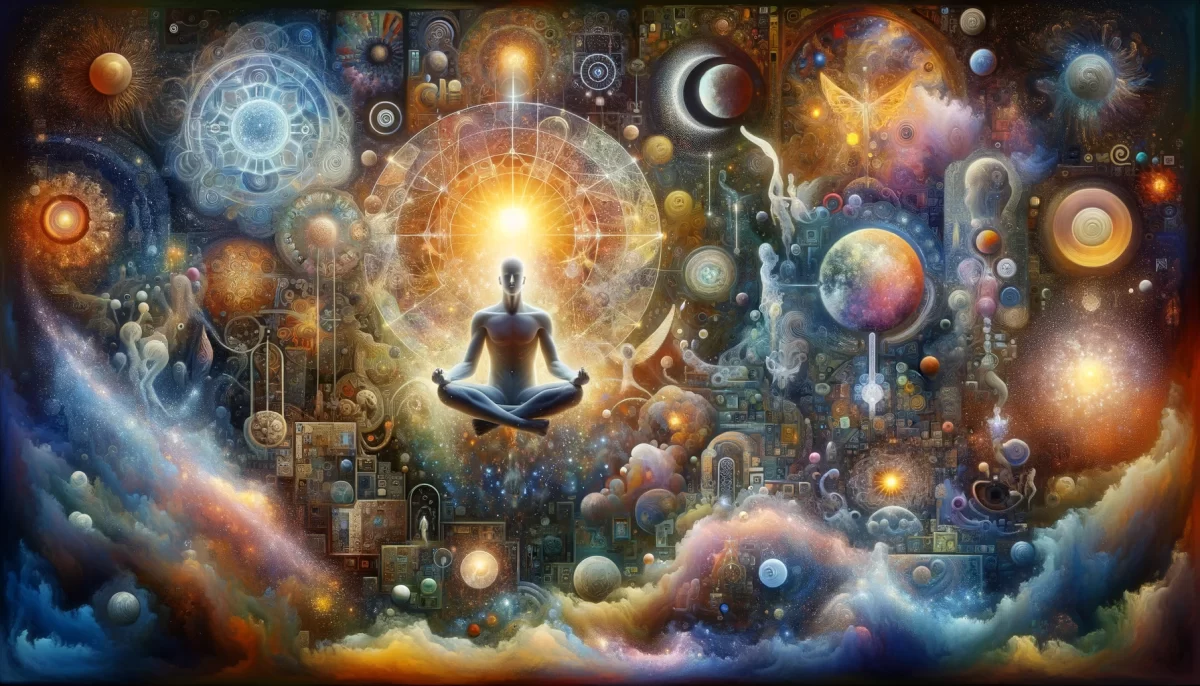


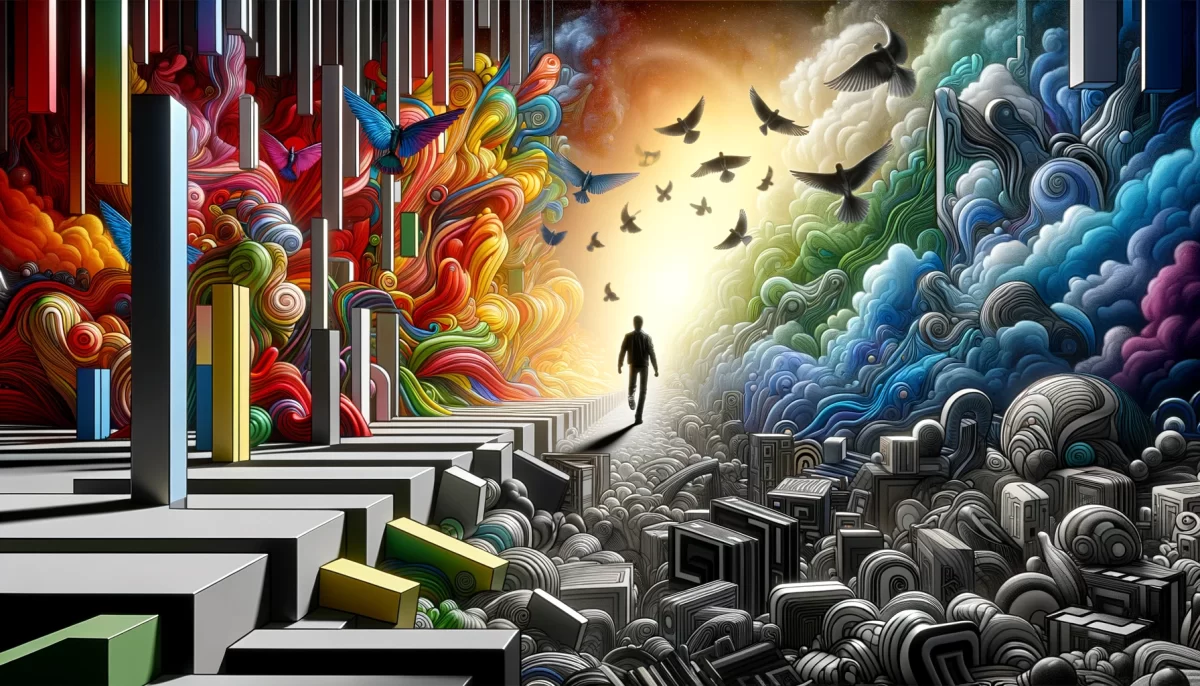

Leave a Reply